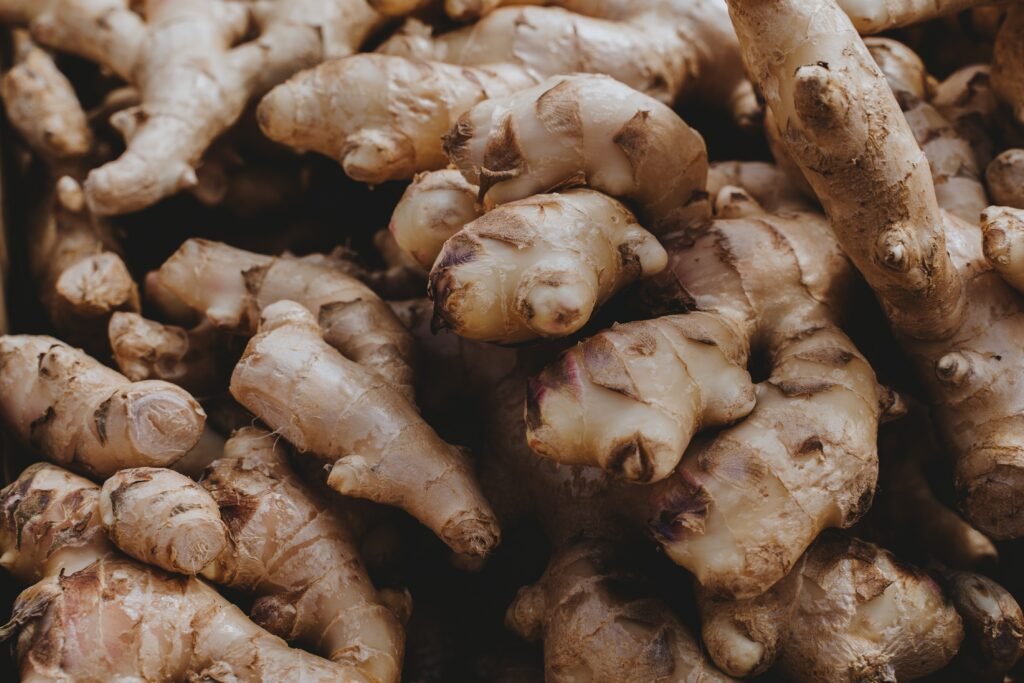Simple overview:
Ginger is good for you. Ginger is a spice that has been used for centuries for its medicinal properties. It is a rhizome, which is a root that grows underground. Ginger is native to Asia, but it is now grown in many parts of the world. There are three main types of ginger: fresh ginger and ground ginger and ginger extract. Fresh ginger is the most flavorful type of ginger, but it can be difficult to find. Ground ginger is more common and is a good substitute for fresh ginger. Ginger extracts are used in many supplements as they provide a higher degree of the active ingredients.

Why this is important:
Ginger has a number of health benefits, including, but not limited to:
- Nausea and motion sickness: Ginger is a well-known remedy for nausea and motion sickness.
- Ginger can help with digestion: Ginger helps to improve digestion by stimulating the production of gastric juices and increasing the motility of the digestive tract. This can help to relieve symptoms of indigestion, bloating, and constipation.
- Ginger can help with pain relief: Ginger has been shown to be effective in relieving pain from a variety of conditions, including arthritis, muscle pain, and headaches.
- Ginger can boost immunity: Ginger has antioxidant and anti-inflammatory properties that can help to boost the immune system and protect against infection.
- Ginger can help with cancer prevention: Ginger has been shown to have anti-cancer properties in laboratory studies. It may help to prevent the growth of cancer cells and reduce the risk of developing cancer.
Basic details:
The following is a key word summary of the benefits of ginger:
Protective:
- antiviral
- antibiotic
- anticancer
- antifungal
- antiobesity
- antioxidant
- antidiabetic
- antibacterial
- antimicrobial
- anti-inflammatory
- prevents periodontal disease
- indirectly inhibits T cell activation
- reduces cardiac and hepatic disorders
Enhances:
- pain reliever
- healthy aging
- prebiotic properties
- enhances testosterone
- as an neurotrophic and adaptogen
- improves muscle gain and recovery
Improves:
- gastroprotective
- treats migraine attacks
- favorable effects on blood pressure
- effective in preventing gastric ulcers
- increased abundance of Bifidobacterium significantly
- inhibits macrophage activation and APC function
Into the details:
The science behind these benefits:
The following excerpt have been compiled from research papers and studies found on the website https://pubmed.ncbi.nlm.nih.gov/ . PubMed® comprises more than 35 million citations for biomedical literature from MEDLINE, life science journals, and online books. PubMed® in a website of the National Center for Biotechnology Center, of the National Library of Medicine, of the U.S. Department of Health and Human Services (HHS).
There are over 5,203 trials, analyses, and scientific reviews of “Ginger” found on PubMed. Here are a few:
“A recent update on the multifaceted health benefits associated with ginger and its bioactive components”
PMID: 33367423 2021 Jan 21
Abstract: “Zingiber officinale is a medicinal herb that has been commonly used in food and pharmaceutical products. It was revealed that its functionalities are attributed to several inherent chemical constituents, including 6-gingerol, 8-gingerol, 10-gingerol, 6-shogaol, 6-hydroshogaol, and oleoresin, which were established through many studies (in vitro, in vivo, and cell lines).
Their consumption may reduce or delay the progression of related diseases, such as cancer, diabetes, and obesity, via modulation of genetic and metabolic activities.”
“A review of the gastroprotective effects of ginger (Zingiber officinale Roscoe)”
PMID: 23612703 2013 Jun 4
Abstract: “Ginger rhizomes have been used since antiquity in the various traditional systems of medicine to treat arthritis, rheumatism, sprains, muscular aches, pains, sore throats, cramps, hypertension, dementia, fever, infectious diseases, catarrh, nervous diseases, gingivitis, toothache, asthma, stroke and diabetes.
Ginger is also used as home remedy and is of immense value in treating various gastric ailments like constipation, dyspepsia, belching, bloating, gastritis, epigastric discomfort, gastric ulcerations, indigestion, nausea and vomiting and scientific studies have validated the ethnomedicinal uses.
“Zingiber officinale Improves Cognitive Function of the Middle-Aged Healthy Women”
PMID: 22235230 2011 Dec 22
Abstract: “We found that the ginger-treated groups had significantly decreased P300 latencies, increased N100 and P300 amplitudes, and exhibited enhanced working memory.
Therefore, ginger is a potential cognitive enhancer for middle-aged women.”
“Ginger and avocado as nutraceuticals for obesity and its comorbidities”
PMID: 31989713 2020 Jun
Abstract: “Reports have shown that ginger and avocado induce antioxidant and anti-inflammatory effects by improving enzymatic activity and modulating obesity-related impairments in the anti-inflammatory system in different tissues, without side effects. Furthermore, ginger and avocado were found to be effective in reversing the harmful effects of obesity on blood lipids.
In conclusion, on the basis of the positive effects of ginger and avocado in in vitro, animal, and human studies, these nutraceuticals may be useful in obesity treatment.”
Does ginger supplementation lower blood pressure? A systematic review and meta-analysis of clinical trial
PMID: 30972845 2019 Apr 11
Abstract
Abstract: “When studies were categorized based on participants’ mean age, ginger dosage and duration of intervention, systolic BP and diastolic BP were significantly decreased only in the subset of studies with mean age ≤ 50 years, follow-up duration of ≤8 weeks and ginger doses ≥3 g/d.
Our findings revealed that ginger supplementation has favorable effects on BP.”
“Ginger and Testosterone“
PMID: 30360442 2018 Oct 22
Abstract: ” The mechanisms by which this occurs mainly by enhancing luteinizing hormone (LH) production, increasing the level of cholesterol in the testes, reducing oxidative stress and lipid peroxidation in the testes, enhancing the activity of the antioxidant enzymes, normalizing blood glucose, increasing blood flow in the testes, increasing testicular weight, and recycling testosterone receptors.”
In conclusion, the mainstream of research that links ginger to testosterone demonstrated that ginger supplementation, particularly in oxidative stress conditions, enhances testosterone production in males.
“Assessing the Effects of Ginger Extract on Polyphenol Profiles and the Subsequent Impact on the Fecal Microbiota by Simulating Digestion and Fermentation In Vitro“
PMID: 33086593 2020 Oct 19
Abstract: “The purpose of this study was to investigate the digestion stability of ginger polyphenols and their prebiotic effects on gut microbiota by simulating digestion and fermentation in vitro.
Additionally, the quantitative PCR results showed that 6-gingerol (6G), as the main polyphenol in GE, increased the abundance of Bifidobacterium significantly. Therefore, 6G is expected to be a potential prebiotic that improves human health by promoting gut health.“
“Ginger extract inhibits LPS induced macrophage activation and function”
PMID: 18173849 2008 Jan 3
Abstract: “Background: Macrophages play a dual role in host defence. They act as the first line of defence by mounting an inflammatory response to antigen exposure and also act as antigen presenting cells and initiate the adaptive immune response. They are also the primary infiltrating cells at the site of inflammation. Inhibition of macrophage activation is one of the possible approaches towards modulating inflammation.
In conclusion ginger extract inhibits macrophage activation and APC function and indirectly inhibits T cell activation.”
“Ginger Extract Decreases Susceptibility to Dextran Sulfate Sodium-Induced Colitis in Mice Following Early Antibiotic Exposure”
PMID: 35071260 2022 Jan 5
Abstract: “Results: Ginger extract prevented weight loss, colon shortening, inflammation, and intestinal barrier dysfunction in mice exposed to antibiotics in early life. Ginger increased the bacterial diversity and changed the abundance of bacterial belonging to family Peptococcaceae and Helicobacter species to modulate microbiota structure and composition adversely affected by early antibiotic exposure.
Conclusion: Ginger has a protective effect in potentially decreasing the susceptibility to colitis in mice exposed to antibiotics early in life.“
“Ginger Extract Suppresses Inflammatory Response and Maintains Barrier Function in Human Colonic Epithelial Caco-2 Cells Exposed to Inflammatory Mediators”
PMID: 28369951 2017 Mar 29
Abstract: “The beneficial effects of ginger in the management of gastrointestinal disturbances have been reported. In this study, the anti-inflammatory potential of ginger extract was assessed in a cellular model of gut inflammation. In addition, the effects of ginger extract and its major active compounds on intestinal barrier function were evaluated.
Taken together, these results show that ginger extract may be developed as a functional food for the maintenance of gastrointestinal health.”
“Protective Effects of Ginger (Zingiber officinale) Extract against Diabetes-Induced Heart Abnormality in Rats”
PMID: 26912155 2016 Feb
Abstract: “Background: Diabetic cardiomyopathy is an important causal factor in morbidity and mortality among diabetic patients, and currently, no effective means are available to reverse its pathological progress. Conclusion:
The findings indicated that ginger extract significantly reduces heart structural abnormalities in diabetic rats and that these effects might be associated with improvements in serum apo, leptin, cathepsin G, and Hcy levels and with the antioxidant properties of ginger extract.”
“Gingerols and shogaols: Important nutraceutical principles from ginger”
PMID: 26228533 2015 Jul 27
Abstract: “Both gingerols and shogaols exhibit a host of biological activities, ranging from anticancer, anti-oxidant, antimicrobial, anti-inflammatory and anti-allergic to various central nervous system activities. Shogaols are important biomarkers used for the quality control of many ginger-containing products, due to their diverse biological activities. In this review, a large body of available knowledge on the biosynthesis, chemical synthesis and pharmacological activities, as well as on the structure-activity relationships of various gingerols and shogaols, have been collated, coherently summarised and discussed. The manuscript highlights convincing evidence indicating that these phenolic compounds could serve as important lead molecules for the development of therapeutic agents to treat various life-threatening human diseases, particularly cancer.
Inclusion of ginger or ginger extracts in nutraceutical formulations could provide valuable protection against diabetes, cardiac and hepatic disorders.“
“Ginger and Heart Health: From Mechanisms to Therapeutics”
PMID: 33297926 2021
Abstract: “Background: As a major cause of morbidity and mortality, cardiovascular diseases (CVDs) are globally increasing. In spite of recent development in the management of cardiovascular complications, CVDs have remained a medical challenge.Conclusion:
This study revealed the biological activities, health benefits, and cardioprotective properties of ginger/ginger constituents along with related mechanisms of action, which gave new insights to show new avenues in the treatment of CVDs.”
“Comparison between the efficacy of ginger and sumatriptan in the ablative treatment of the common migraine”
PMID: 23657930 2013 May 9
Abstract: “Frequency and torment caused by migraines direct patients toward a variety of remedies. Few studies to date have proposed ginger derivates for migraine relief. This study aims to evaluate the efficacy of ginger in the ablation of common migraine attack in comparison to sumatriptan therapy.
Clinical adverse effects of ginger powder were less than sumatriptan. Patients’ satisfaction and willingness to continue did not differ.
The effectiveness of ginger powder in the treatment of common migraine attacks is statistically comparable to sumatriptan. Ginger also poses a better side effect profile than sumatriptan.”
“Ginger extract diminishes chronic fructose consumption-induced kidney injury through suppression of renal overexpression of proinflammatory cytokines in rats”
PMID: 24885946 2014 May 27
Abstract: “Background: The metabolic syndrome is associated with an increased risk of development and progression of chronic kidney disease.Conclusions: The present results suggest that ginger supplement diminishes fructose-induced kidney injury through suppression of renal overexpression of macrophage-associated proinflammatory cytokines in rats.
Our findings provide evidence supporting the protective effect of ginger on the metabolic syndrome-associated kidney injury.“
“Antioxidant activities of ginger extract and its constituents toward lipids”
PMID: 28873530 2017 Jul 12
Abstract: “Lipid oxidation-a major cause of food product deterioration-necessitates the use of food additives to inhibit food oxidation. Ginger extract (GE) has been reported to possess antioxidant properties.
Overall, GE displayed the strongest dose-dependent antioxidant properties, especially at high temperatures, thereby demonstrating that GE can be employed as a natural antioxidant in lipid-containing processed foods.“

